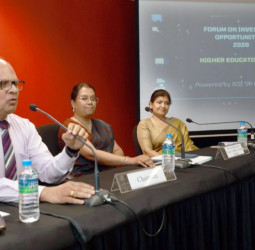By Indika De Zoysa
Education today is not limited to classroom walls or traditional syllabi. It flows through algorithms, creators, and platforms that reach millions in seconds. As Sri Lanka seeks to accelerate its digital transformation, this convergence of education, technology, and social media offers both opportunity and responsibility, which is an opportunity to democratize access to knowledge, and a responsibility to ensure that what reaches young minds is credible, inclusive, and empowering.
The recent launch of TikTok’s dedicated STEM Feed in partnership with the Government of Sri Lanka is a timely example of how these forces can align. For the first time, a global digital platform has collaborated with our education authorities to create a curated space for science, technology, engineering, and mathematics content. More importantly, it symbolizes a tripartite model for digital learning — one that unites government leadership, youth participation, and private innovation.
The government: Policy and infrastructure for a digital learning ecosystem
Governments play the foundational role in setting the standards for equitable access and safe participation. The integration of STEM priorities into Sri Lanka’s education policy, coupled with investments in digital infrastructure, positions the country to build an ecosystem that goes beyond mere connectivity. Initiatives such as smart classrooms, coding in schools, and rural digital learning hubs demonstrate how public policy can nurture talent pipelines for the future workforce.
But infrastructure alone is not enough. We need policies that encourage content partnerships, local language learning, and inclusive digital participation, ensuring that the tools of learning are relevant to the realities of every child, regardless of geography or economic background.
The youth: From consumers to co-creators
Sri Lanka’s youth are among the most connected generations in South Asia. Every day, they use technology not just to consume information, but to create, collaborate, and communicate. This participatory culture makes them powerful agents in shaping the future of learning.
When young creators use platforms like TikTok, YouTube, or local EdTech apps to explain complex topics — from climate science to robotics — they are not merely sharing videos. They are translating knowledge into culture, making education social, relatable, and aspirational. The challenge and the opportunity lie in channeling this energy towards structured, credible, and nationally aligned learning outcomes.
Social media and industry: The bridge between engagement and education
Social media is now one of the world’s largest classrooms. Platforms that once existed for entertainment have evolved into powerful discovery tools for learning and innovation. For Sri Lanka, the key is to leverage these platforms not as distractions, but as delivery channels for development.
Industry players must continue to work with educators and policymakers to maintain content integrity, data transparency, and user safety. TikTok’s introduction of features such as Family Pairing, time management tools, and proactive content moderation are examples of how designing for safety can coexist with creativity.
If more digital companies adopt similar approaches, like building ecosystems where learning is engaging, inclusive, and secure, we will see the rise of a national digital education framework that is both sustainable and scalable.
Towards a shared vision for digital learning
The future of education in Sri Lanka will not be defined by one ministry, one platform, or one policy. It will depend on how we bring together the strengths of each — the government’s regulatory guidance, the private sector’s innovation, and the youth’s creativity.
Digital learning is no longer a luxury; it is a national imperative. When aligned with the country’s broader development goals, it can transform Sri Lanka into a hub of educational excellence and digital empowerment, ensuring that our next generation is not only ready for the future, but capable of shaping it.
(The writer is the Vice Chairman of Computer Society of Sri Lanka and a veteran ICT leader)



 A.R.B.J Rajapaksha
A.R.B.J Rajapaksha



